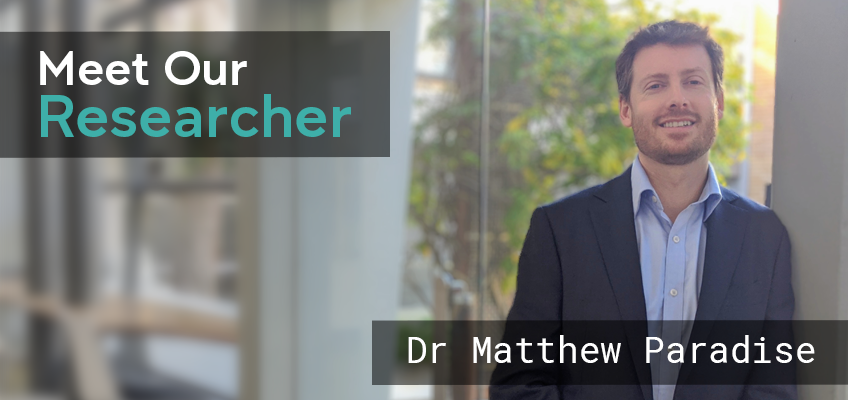26 May 2020

Dr Matt Paradise’s dual role as both clinician and researcher has developed his unique understanding of the dementia experience. More than ever, it is essential that practitioners have the best diagnostic tools and Dr Paradise intends to forge this reality.
How did you get into researching the ageing brain?
While undertaking my psychiatric training, I took on a term in old age psychiatry. I worked with an inspirational Professor of Old Age Psychiatry, Professor Gill Livingston, who became my mentor. Following the clinical term, I was lucky enough to have a full-time research job with her for six months where I also undertook a Masters of Psychiatric Research. We produced my first publications in dementia which looked at the effects of education on survival in Alzheimer’s disease and developed an index to help predict prognosis and survival of dementia.
Did you experience a ‘defining moment’ which led you to this field?
When you are doing your psychiatric training, you work with different age groups and patient populations including learning disability, old age, child and adolescent, rehabilitation and more. I liked working with the older population and thought they were a very worthy group to work with - I found them to be interesting, complex, respectful and appreciative of the support offered.
Do you have any personal interests or activities which are protective behaviours against cognitive decline?
I regularly run - often after my toddler – as well as cycle and do other forms of exercise. I try to eat healthily but frequently fail. I keep my brain active by playing board games such as Scrabble, Backgammon, Codenames, doing puzzles and continuing my research.
What are you currently researching?
The overall theme of the research I am undertaking is imaging in dementia and trying to better quantify markers of cerebrovascular disease. The importance of vascular disease in dementia and brain health is being increasingly recognised, both as a disease in its own right and as a factor that worsens the risk and expression of Alzheimer’s disease. Cerebrovascular disease is important to study as many of its risk factors are modifiable and this is currently the best route to reduce dementia. When we talk about modifiable risk, we are referring to factors such as exercise, diet, blood pressure and cholesterol. As we increasingly recognise how important vascular disease is in dementia and what we should do about it, the obvious requirement is the ability to accurately measure it. There are a lot of different manifestations of vascular disease and different underlying pathologies and lesions. There is a lot of work in trying to better understand how these lesions relate and how you should weight the significance of different pathologies. Fundamentally, that is what my research is about.
The importance of vascular disease in dementia and brain health is being increasingly recognised, both as a disease in its own right and as a factor that worsens the risk and expression of Alzheimer's disease.
Why is your research important?
Cerebrovascular disease research is still relatively in its infancy. Increased understanding of the disorders will allow practitioners to make better diagnoses, more accurately differentiate dementia subtypes from one another and better discuss prognosis. This is highly relevant when determining whether a patient has vascular dementia, Alzheimer’s disease or a combination of diseases. Improved diagnostic accuracy leads to superior drug trials and tailored treatment plans catering to the individual patient’s needs.
What do you love about working at CHeBA?
CHeBA is highly collaborative. I have easy access to specialists in different fields that interface with my own including neuroimaging scientists and statisticians. Everyone is happy to work together collectively and share information to support each other’s research.
What is the ultimate hope you have for your research?
To develop a tool used across the community of research and clinicians, so that they have the most accurate information at their disposal to diagnose and treat cognitive impairment. Ultimately, I hope this will improve the quality of life of individuals with cognitive impairment and their families. Being a clinician, I work with dementia patients and their families every week and see just how terribly sad the disease can be. It would be enormously worthwhile if I can contribute even a little toward reducing the burden of dementia; something we are all working toward achieving.
This interview was undertaken during the COVID-19 self-isolation period. Dr Matt Paradise found that having video calls with his friends and family in both the UK and USA supported his mental resilience and kept him feeling socially connected while physically isolated.
Donations are fundamental for critical research to continue following COVID-19.
If you would like to discuss supporting Dr Paradise’s work specifically, or would like information
on leaving a legacy via a Gift in your Will, please contact h.douglass@unsw.edu.au.

Dr Matt Paradise trained in the UK and Australia and received a Masters of Psychiatric Research from University College London (UCL). He is a Research Fellow within CHeBA’s Neuroimaging Group and a practicing Old Age Psychiatrist. He is the recipient of the Josh Woolfson Memorial Scholarship and the recipient of a Dementia Centre for Research Collaboration grant to develop a novel MRI-based cerebrovascular pathology index. He hopes that one day the Index will be used to improve diagnostic procedures for clinicians, researchers and the wider community.
